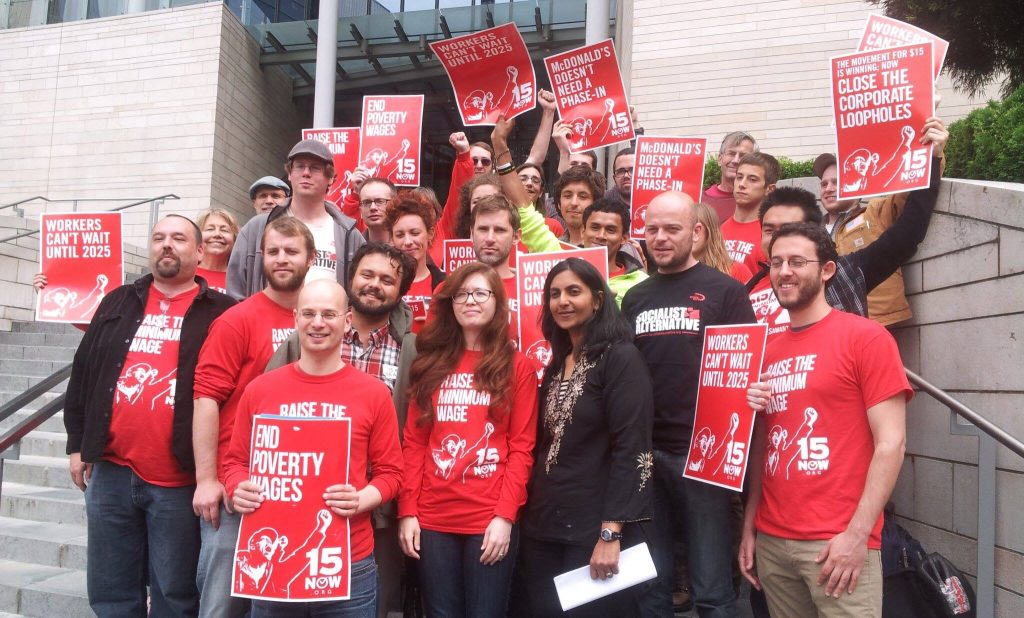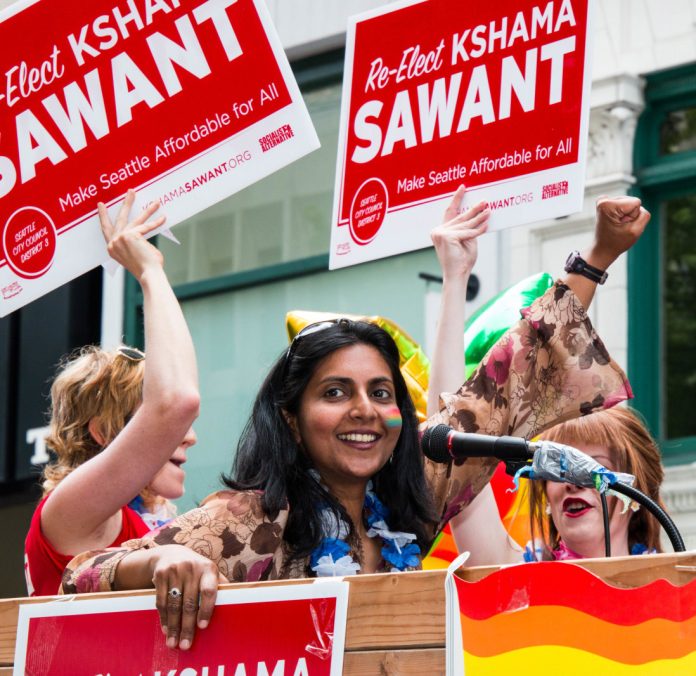Update: Councilmember Kshama Sawant pulled ahead in Friday returns and is now leading by 3.6 points. She will be reelected.
November 13th Update: Sawant now leads by 4 points.
Councilmember Kshama Sawant was the Seattle Metropolitan Chamber of Commerce’s number one target this election, and her reelection prospects looks dicey in the first batch of returns on Election night–she trailed by eight points. By Thursday’s ballot drop, she had trimmed the margin to just 2.5% and only 739 votes separated her from District 3 (D3) challenger Egan Orion. Sawant will pass him today if she maintains her momentum from yesterday’s drop.
King County Elections announced it will make two ballot count updates today: one at 4pm and another at 8:30pm to deal with the glut of late ballots, which it estimated at 73,000 for Seattle and 13,000 in D3 alone. In all, King County has about 182,000 outstanding ballots to count, the agency said.
Late returns are a standard part of elections in Washington state, where we vote by mail–though sometimes not fully understood by outside observers. The Post Office becomes a bottleneck in the last few days of an election as ballots flood in, as are ballot return boxes. Washingtonians have three weeks to vote, but many still wait until Election Day, either to gather more information on the candidates or out of good old fashioned procrastination. Last minute voters’ ballots can’t be tallied by Election night, but by 8:30 tonight the vast majority of ballots should be counted.
A last minute surge in voting like we saw this election is what propelled Sawant to victory over incumbent Richard Conlin in 2013, shocking the political establishment and guaranteeing the fight for a $15 minimum wage wasn’t going to get sucked into a Seattle Process vortex and disappear.
Fight for 15’s Success
Seattle passed a $15 minimum wage in 2014, and, since being phased in, it’s widely heralded as a success. Even its biggest local critic in libertarian-leaning University of Washington economist Jacob Vigdor has since come around despite the minimum wage study he led initially being highly critical. “If you offer the minimum wage and you can’t hire anyone, the minimum wage is not really your problem, your problem is a labor shortage,” Vigdor said in an article by Seattle PI’s Becca Savranksy.
Vigdor had initially argued that the minimum wage had cost jobs and hurt low-wage workers, ignoring the boom effect to which he more recently alluded: employers struggling to fill jobs in a booming (and thus tight) labor market compounded by an acute housing crunch. The UW Minimum Wage Study team has since revised their initial 2016 finding, lowering their claim of harm. By the way, Sawant is an economist too, and it could be she’s the more perceptive one.

With a higher minimum wage in place, critics had suggested Sawant had outlasted her usefulness and no longer had a rallying cause. But Jacob Vigdor perhaps inadvertently offered support for Sawant’s housing focus this election. Sawant has run on lowering housing costs and reducing displacement through rent control, more public housing, tiny house villages, and reforms to single-family zoning. I wrote that progressives are winning the housing debate, and if Sawant pulls off the comeback, it will be yet more proof.
Andrew Lewis Blasts Pass Jim Pugel in D7
Meanwhile, Andrew Lewis passed Jim Pugel in D7, securing another victory for the progressive slate of candidates. Lewis trailed by a point on election night but now leads by 1.5%. Lewis has also championed social housing and reforms to single-family zoning.
Shaun Scott Closing on Pedersen But Still 10 Points Back
The only race where the more conservative candidate appears headed to victory is D4, where Alex Pedersen is up 10 points after yesterday’s count, a 2,371 vote margin. That’s significantly less than his 16-point advantage election night, but still a tough gap to close. About 10,000 ballots remain to be counted, King County Elections said. Scott will have to take more than 60% of outstanding ballots to win.
And it should be noted that if any race ends with a margin less than 150 votes, it will go into an automatic recount.
Why did Shaun Scott struggle and Kshama Sawant have a nailbiter while other progressives surged to victory? Them embracing the socialist label has been one explanation, but clearly race also plays a huge factor. The Shaun Scott campaign saw one of their yard signs defaced with the N-word in the last weeks of the election, underscoring that some D4 residents were still resistant to the idea of Black leadership.
Shaun Scott bravely went into the eye of the storm, identifying himself as a Black Lives Matter activist who supports abolishing our existing racist policing system. He spoke this truth to power at a Seattle Police Officers Guild forum that his opponent, meanwhile, skipped. It’s the jolt we likely need to break from our racist past and present, but in D4 it likely came across as a lot of rocking the boat for folks used to being very comfortable and undisturbed by such matters–particularly coming from a young Black man who already elicits our unconscious (and conscious) biases.
Even Alex Pedersen’s strategy of skipping forums with his opponent could be seen as an extension of modern “colorblind” style racism. Pedersen didn’t say anything overtly racist, he just largely refused to acknowledge or see his opponent at all. Pedersen ran on accountability, but when it came to being accountable for his own White privilege, he took a pass. That’s how when your opponent talks about the racist roots of single-family zoning, you can just change the subject and quietly use that issue to shake out more homeowner votes.
Roundup of Other Races
Meanwhile in races that progressives lead on election night, those leads have only grown larger. Tammy Morales has surpassed 58% of the vote in D2, Lisa Herbold has 53.5% in D1, and Dan Strauss has 53.8% in D6 despite a record-setting $831,000 in independent expenditures for his opponent Heidi Wills–most of it by the Seattle Chamber of Commerce’s Civic Alliance for a Sound Economy (CASE) political action committee (PAC).

The one race where the Chamber of Commerce diverged from the Seattle Times Editorial Board was in D5. Debora Juarez earned their ire for initially voting for the head tax–she later voted to repeal it–but challenger Ann Davison Sattler proved too fringe-y for them, putting ‘crack down on the homeless’ a little too front and center for their tastes–though the Times loved her. Juarez has more than 59% of the vote.
Initiative 976 is down to 53.9% of the vote, but still running strong enough to pass, which is why King County and the City of Seattle are announcing lawsuits to block it and restore 175,000 hours of bus service. Meanwhile, state legislators have been all over the place scrambling to come up with a plan or a narrative–they should really backfill the cuts and pass progressive tax reform.
Referendum Measure No. 88, which re-legalizes affirmative action policies at the government level in Washington, is going to be very close. The reject vote is still leading, but the margin has been trimmed. The strength of the King County vote could still flip it in remaining returns. It’s at 51.2% reject to 48.8% approve right now. Passage would help make the Seattle Green New Deal vision a reality by allowing for a mechanism of directing jobs toward impacted communities.
Outside of Scott and Abigail Doerr, who is trailing far behind incument King County Councilmember Jeanne Kohl-Welles, candidates and causes The Urbanist endorsed are in strong positions to win. Seattle Port Commission candidates Sam Cho and Fred Felleman are cruising to victory. Girmay Zahilay is well ahead of incumbent Larry Gossett in King County Council District 2. Urbanist-endorsed incumbents Claudia Balducci and Joe McDermott are coasting to reelection.
Hopefully these electoral successes mean we see progress. With Sawant likely sticking around Seattle City Hall, issues like rent control and boosting funding for social housing are not going away.
Doug Trumm is publisher of The Urbanist. An Urbanist writer since 2015, he dreams of pedestrian streets, bus lanes, and a mass-timber building spree to end our housing crisis. He graduated from the Evans School of Public Policy and Governance at the University of Washington in 2019. He lives in Seattle's Fremont neighborhood and loves to explore the city by foot and by bike.



